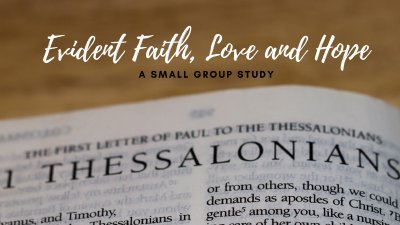


1st Thessalonians -- Evident Faith, Love and Hope
A Six-lesson Small Group Study
Chapter 1 – Evident Faith
John Morrison • 1 Thessalonians 1
The first thing Paul appreciates about the Thessalonian Christians is their work of faith. This means things they were busy doing because of their faith in Christ. The second thing Paul remembers fondly about the Thessalonians is their labor of love. Though the work of faith was a focus on the thing done, the labor of love is more a focus on the motivation for labor expended to the point of weariness. Paul’s crescendo of compliment to the Thessalonians is that with eyes of faith, they have seen the invisible God and are anxiously waiting for the Son who is as surely going to return to rescue them from God’s wrath as He surely was resurrected. His coming again to earth is tied here — as elsewhere — to His historical resurrection.
Chapter 2 – Evident Love
John Morrison • 1 Thessalonians 2
Paul begins the second chapter by telling them that his coming was not in vain. Part of Paul’s explanation for why it wasn’t in vain had to do with something they were well aware of — how mistreated he had been in Philippi. They received what God said even in trial. They had become Paul's joy and glory.
Chapter 4b and 5 -- Evident Hope
John Morrison • 1 Thessalonians 4:13—5:28
In chapter 4, verses 13-18, Paul encourages them about believers who have already died. He wants them to not lose heart when their loved ones die. In so doing, he gives some of the clearest teaching in the Bible about the “snatching” – the Rapture of the church when Jesus comes for His bride. Then in chapter 5, verses 1-11, he encourages them about Christ’s subsequent return to the earth in judgment on the nations and all who have rejected Him and warred against Him and His church. He then closes in verses 13-28 with some final pastoral instructions for the church.


